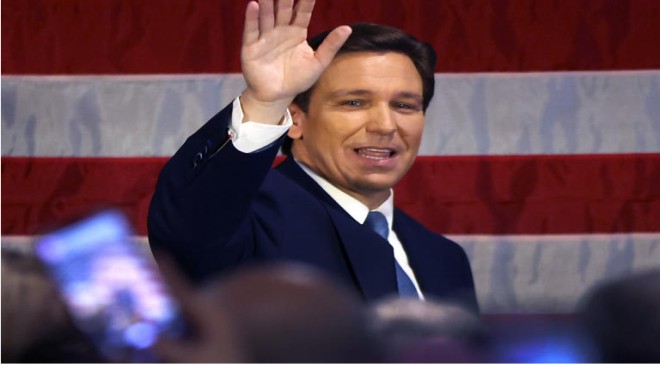Florida Gov. Ron DeSantis likes to brag about his state’s education system. And for good reason.
Florida’s sprawling higher education system, which enrolls roughly 1 million students across 12 public universities or colleges and 28 community and state colleges, keeps in-state tuition and fees low – very low, at less than $5,000 on average for four-year institutions, according to recent data. And at a moment when schools are struggling to retain students, nearly three-quarters of those enrolled in four-year degree programs graduate in a timely manner, as do more than half of those enrolled in two-year programs. When it comes to debt upon graduation, Florida boasts one of the lowest burdens on borrowers in the country.
The Sunshine State’s public K-12 system doesn’t carry the same accolades as its higher education offerings, but it’s nothing to scoff at, either. While the state’s math and reading scores aren’t a standout bright spot – students largely scored in the middle of the pack on the 2022 National Assessment of Educational Progress – it reports a recent 90% high school graduation rate and nearly half of all students are college-ready, having passed benchmarks on the SAT or ACT.
The powerful combination is what landed Florida at the top of U.S. News & World Report’s best states for education rankings.
Read More:-11 Expenses That Almost Totally Disappear When You Retire
But DeSantis, a likely GOP candidate in the 2024 presidential election – and the only Republican challenger currently polling in striking distance of former President Donald Trump – has been heavily touting another education record of late, one that some experts worry may eventually undermine the quality of education in the state.
As he makes strategic visits to Iowa – the first-in-the-nation caucus state for Republicans – and other important early primary states like Nevada, New Hampshire and South Carolina, DeSantis is highlighting a controversial platform that poured accelerant on long-standing culture wars by attempting to curb access to education about race and inequality, LGBTQ issues and gender identity, and to foist a sweeping conservative takeover on higher education.
Now, some are worried that his supercharged agenda is undermining trust in the state’s public education systems.
Also Read– Before You Buy VICI Properties: Here’s a Net-Lease REIT Stock I’d Buy First
“The major divide between states like Florida and the states and localities that have performed poorly in recent years may very well be the issue of wokeness,” DeSantis writes in his new memoir, “The Courage to Be Free,” in which he cites Florida’s No. 1 ranking for higher education in the U.S. News Best States assessment. (The state has placed No. 1 in that subcategory every year since the rankings launched in 2017.)
“What jurisdiction governed by leftist ideology would one point to as a success,” he asks. “From Los Angeles and San Francisco to New York and Chicago, virtually every jurisdiction that has adopted a leftist governing philosophy has seen major problems, including increasing crime, loss of population, erosion in education quality and decline in the overall quality of life. What these jurisdictions have in wokeness their leaders lack in basic common sense. Compared to these leftist fiefdoms, Florida is a redoubt of sanity – the place where woke ideology goes to die.”
Read More:– 5 Women-Led Businesses Absolutely Crushing the Stock Market Right Now
The message – one likely to woo conservative voters in a primary that by all accounts will go to the contender who can stake out the farthest-right position – has energized Republicans and resulted in other GOP governors pushing copycat platforms and similar, if not the exact same, bills in their state legislatures. But critics in Florida and around the country say the message is a dangerous one, and that coupled with major legislative changes to K-12 and higher education operations, DeSantis stands to inflict blunt force trauma to the very system that makes Florida stand out.
“One of the things that we’re seeing in the entire system, from pre-K through higher ed, is this attack on free thought and on diversity and equity and inclusion and this idea of trusting the experts,” says Andrew Spar, president of the Florida Education Association, the state’s largest teachers union. “We should be talking about how we’re addressing reading instruction in elementary school, but there’s no conversation happening about reading in the state of Florida right now. Instead it’s about whether or not we should have transgender bathrooms and it’s about whether or not we teach woke in our schools and whether woke is a bad thing.”
Read More:– Want $1 Million in Retirement? Invest $250,000 in These 3 Stocks and Wait a Decade.
“We’re going to see significant negative impacts on our student learning as we move forward.”
Earlier this year, DeSantis unveiled a sweeping new proposal for state colleges and universities – one that would defund diversity, equity and inclusion efforts, give boards of trustees the power to review tenure at any time and establish mandatory courses in Western civilization. He threatened that Florida may stop offering Advanced Placement courses and SAT tests from the College Board, part of the fallout from his feud with the assessment company over its new AP African American Studies course.
On the K-12 side, DeSantis banned instruction about gender identity and sexual orientation in early grades; signed a law barring transgender athletes from competing on girls sports teams; threw out nearly half of math textbooks submitted for review due to what he called their “woke” ideology; sought to prohibit educators from teaching about racism or any topic in a way that might make someone believe they should feel “guilt, anguish or other forms of psychological distress” because of past actions by someone of their race, sex or national origin; and established a requirement that books in school libraries and assigned in classrooms be reviewed by a district employee with a special certificate.
“This is going to directly impact all the students in that state to a point where there will be an education gap, where students from states where there hasn’t been these state-legislated enacted bans are going to have a different level of learning than students from states where these bans have been enacted,” says Taifha Natalee Alexander, project director of CRT Forward, a database housed at UCLA School of Law’s Critical Race Studies Program that tracks anti-critical race theory legislation at the local, state and federal levels.
“That’s a really scary thing to think about,” she says. “It’s going to impact students’ ability to be able to address some of the most pressing racial and social justice issues of our time.”
Read More:– Best business checking accounts – April 2023
One of the most recent legislative wins for DeSantis – and the one that stands to impact the K-12 system the most – is a massive expansion of Florida’s private school voucher program. In dropping eligibility and enrollment caps, the program could send roughly $4 billion in taxpayer money to cover private school tuition – money that critics note otherwise could be used to bolster the public school system.
“He’s defunding K-12 public education and he’s funneling more and more public money that should go to the public system into the private education system through vouchers,” says Jessica Levin, the acting litigation director at Education Law Center – an education policy organization focused on school funding equity – and director of the Public Funds Public Schools campaign. “It’s very frightening.”
“The anti-CRT, the anti-LGBTQ legislation – what’s commonly called the ‘Don’t Say Gay’ law – it’s all part of a strategy to discredit and sow distrust in the public education system and starve that system in order to manufacture a justification for privatization,” Levin says. “And we’re talking about powerful, supremely well-funded forces at play here.”
Read More:-Why the stock market can’t break through the 4,200 ceiling on the S&P 500
Indeed, the American Federation for Children, the school-choice advocacy group founded by former U.S. Education Secretary Betsy DeVos, poured $9 million into state races during last year’s cycle, backing candidates in favor of expanding school choice options and attempting to oust or block those who did not.
For supporters of DeSantis and other GOP governors in states like Arkansas, Iowa, Utah, Tennessee and Texas, the rise in legislative efforts to funnel public dollars to programs that cover private school tuition is a long time coming. With deep pockets, they’ve been able to capitalize on pandemic-inflicted challenges that public schools have struggled to overcome, even now more than three years later.
Read More:-S&P Edges Lower Ahead of Fed’s Decision; Market Volatility Increases
And it’s a blueprint they’re hoping to take to the White House.
“Education freedom is on the march,” Tommy Schultz, CEO of AFC, said when DeSantis signed into law the bill expanding vouchers in Florida.
“Giving families the freedom to choose the best education for their children – that’s what matters,” he said later. “We’re winning. And they know it.”
In Florida, though, the rash of legislation has had an acute impact on educators across the state.
Florida is hemorrhaging educators and is in the midst of the worst teacher and staff shortage in its history, Spar says. The K-12 system had about 2,200 vacant positions five years ago when DeSantis first took office. In January, it had nearly 5,300 educator vacancies and more than 4,600 support staff vacancies.
Read More:-Jim Cramer Says These Stocks Have Stolen The Earnings Season: ‘It’s Been Pretty Darn Good’
“We are seeing this mass exodus in the profession,” Spar says. “And this lies at the feet of the governor, who has vilified teachers and staff who work in our schools, who has tried to create an environment in which he pits teachers versus teachers and staff versus teachers and parents versus teachers.”
Yet while the DeSantis education agenda is playing well to his conservative base in Florida and perhaps even to Republican voters across the nation who are just getting to know the governor as he glad-hands his way through important early voting states, it remains to be seen whether his record is palatable to moderate Republicans and independents – an important voting bloc the GOP must regain to win in 2024.
Read More:-Poland Takes Fight Over Covid Vaccine to Pfizer Shareholders
“I definitely will not underestimate Ron DeSantis, but I do think he is going to be exposed more and I think he is going to lose a lot of that edge,” Spar says. “But this is a guy who has a ton of money right now, and he intends to use that money and he is using Florida as an experiment.”
“His actions are quite problematic and concerning and should be for anyone who is looking at what’s happening in Florida right now.”





































